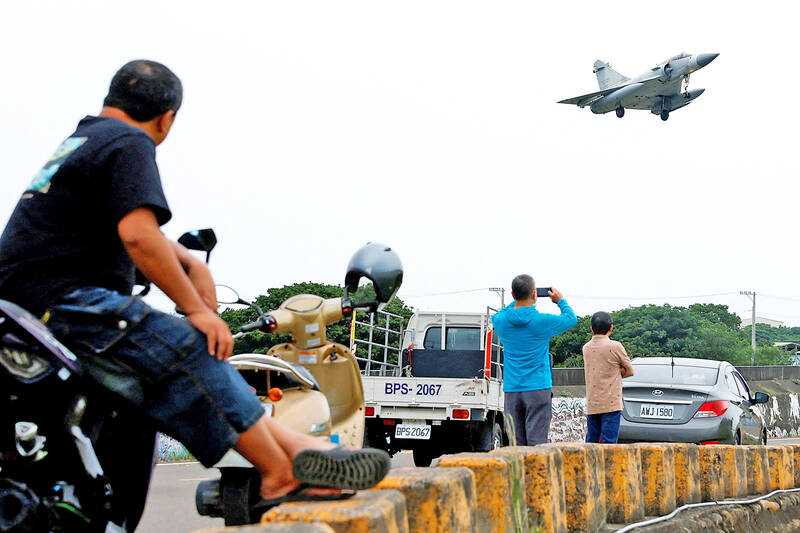China held military drills last week around Taiwan as part of its intimidation tactics, since it is not powerful enough to launch a war against the nation, a US-based professor said on Wednesday.
The Taipei Economic and Cultural Office in Atlanta and the University of South Carolina Walker Institute of International and Area Studies held a conference on Wednesday to discuss the latest developments in the US-Taiwan relationship and the Indo-Pacific, the office said in a press release yesterday.
As this year marks the 45th anniversary of the US’ Taiwan Relations Act and Taiwan’s new government took office earlier this month, political experts were invited to provide their insights and suggestions, it said, adding that about 200 people participated either in-person or virtually.

Photo: Carlos Garcia Rawlins, Reuters
China relies on imports for food and energy, so international sanctions — which would likely be imposed if Beijing were to invade Taiwan — would cause significant harm to its people’s livelihood and economy, University of South Carolina political science professor Hsieh Fu-sheng (謝復生) said.
The “Joint Sword-2024A” exercises Beijing launched around the nation following President William Lai’s (賴清德) inauguration were a part of its consistent strategy of intimidating Taipei, Hsieh said, adding that China is currently not strong enough to rashly start a war.
The exercises not only threatened Taiwan, but also the Western democracies, said Michael Beckley, Tufts University political science associate professor and author of Danger Zone: The Coming Conflict with China.
It would be impossible to predict when and if China would use force against Taiwan in the short term, but one should never expect China to bring peace, Beckley said.
The Taiwan issue is on Chinese President Xi Jinping’s (習近平) priority list, he said.
Xi would not hesitate to invade just because Taiwan is a hub for chip manufacturing, Beckley added.
Taipei and Washington strengthening military cooperation might be the only chance to make Xi put off the issue, he said.
In conflicts between China and the US, political, diplomatic and military factors far outweigh commercial considerations, said Philip Chritton, a visiting academic at the University of South Carolina Darla Moore School of Business.
The Taiwan Relations Act promulgated in 1979 has been indispensable to the close relations between Taiwan and the US, office Director-General Elliot Wang (王翼龍) said.
The Emergency National Security Supplemental Appropriations Act passed by the US Congress last month was a “clear example” of strong international support for stability and security in the Taiwan Strait, Wang said.
“Taiwan plays an indispensable role in the international community,” he added.

An essay competition jointly organized by a local writing society and a publisher affiliated with the Chinese Communist Party (CCP) might have contravened the Act Governing Relations Between the People of the Taiwan Area and the Mainland Area (臺灣地區與大陸地區人民關係條例), the Mainland Affairs Council (MAC) said on Thursday. “In this case, the partner organization is clearly an agency under the CCP’s Fujian Provincial Committee,” MAC Deputy Minister and spokesperson Liang Wen-chieh (梁文傑) said at a news briefing in Taipei. “It also involves bringing Taiwanese students to China with all-expenses-paid arrangements to attend award ceremonies and camps,” Liang said. Those two “characteristics” are typically sufficient

A magnitude 5.9 earthquake that struck about 33km off the coast of Hualien City was the "main shock" in a series of quakes in the area, with aftershocks expected over the next three days, the Central Weather Administration (CWA) said yesterday. Prior to the magnitude 5.9 quake shaking most of Taiwan at 6:53pm yesterday, six other earthquakes stronger than a magnitude of 4, starting with a magnitude 5.5 quake at 6:09pm, occurred in the area. CWA Seismological Center Director Wu Chien-fu (吳健富) confirmed that the quakes were all part of the same series and that the magnitude 5.5 temblor was

The brilliant blue waters, thick foliage and bucolic atmosphere on this seemingly idyllic archipelago deep in the Pacific Ocean belie the key role it now plays in a titanic geopolitical struggle. Palau is again on the front line as China, and the US and its allies prepare their forces in an intensifying contest for control over the Asia-Pacific region. The democratic nation of just 17,000 people hosts US-controlled airstrips and soon-to-be-completed radar installations that the US military describes as “critical” to monitoring vast swathes of water and airspace. It is also a key piece of the second island chain, a string of

The Central Weather Administration has issued a heat alert for southeastern Taiwan, warning of temperatures as high as 36°C today, while alerting some coastal areas of strong winds later in the day. Kaohsiung’s Neimen District (內門) and Pingtung County’s Neipu Township (內埔) are under an orange heat alert, which warns of temperatures as high as 36°C for three consecutive days, the CWA said, citing southwest winds. The heat would also extend to Tainan’s Nansi (楠西) and Yujing (玉井) districts, as well as Pingtung’s Gaoshu (高樹), Yanpu (鹽埔) and Majia (瑪家) townships, it said, forecasting highs of up to 36°C in those areas